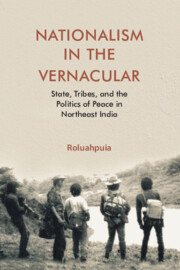Book contents
- Frontmatter
- Dedication
- Contents
- List of Figures
- Preface
- Acknowledgements
- List of Abbreviations
- Notes on Transliteration and Translation
- 1 Introduction
- 2 The ‘Tribal Question’ in India: Problem of Inclusion
- 3 The Emergence of Mizo Nationalism: The Formative Phase
- 4 The Mizo National Front and the Vernacularization of Nationalism
- 5 Violence, Counter-Insurgency, and the Transcript of Resistance
- 6 Discord, Accord, and the Politics for Peace
- 7 Conclusion
- Glossary
- References
- Index
7 - Conclusion
Published online by Cambridge University Press: 30 April 2023
- Frontmatter
- Dedication
- Contents
- List of Figures
- Preface
- Acknowledgements
- List of Abbreviations
- Notes on Transliteration and Translation
- 1 Introduction
- 2 The ‘Tribal Question’ in India: Problem of Inclusion
- 3 The Emergence of Mizo Nationalism: The Formative Phase
- 4 The Mizo National Front and the Vernacularization of Nationalism
- 5 Violence, Counter-Insurgency, and the Transcript of Resistance
- 6 Discord, Accord, and the Politics for Peace
- 7 Conclusion
- Glossary
- References
- Index
Summary
The relevance of nationalism is hard to underestimate. It remains a strong force of political mobilization shaping contemporary society and politics. The past few years have seen the resurgence of what is commonly referred to as right-wing nationalism across the globe. Such movements are characterized by their ideological appeal to exclusive claims on ethnic and racial purity. More so, they envision a homogenous conception of nationhood defined by majoritarian identity and culture. This has brought back the issue of nationalism at the very centre of academic focus. In India, too, the growing force of right-wing nationalism has affected, if not complicated, regional and nationalist politics. However, the focus on this has been largely confined to rightwing forces’ ideologies and electoral success. Rarely does one see how this is altering the nationalist politics, such as between the right-wing parties and those that profess a separate, if not strong, sense of nationalism at the sub-state and regional levels.
In India, the discourse of national integration is premised on the idea of anxiety and insecurity. Even after over 70 years of India's independence, the northeast region remains in a state of permanent exception. When it comes to national policies towards the region, one has not seen a shift irrespective of the powers that be at the centre (Baruah 2020). Since 2014, the BJP has succeeded in making inroads in various parts of the region and taking over political power in a majority of the states. With this, there is a renewed push for integration of the region within the national ethos and culture of the country. While one may remain critical of the right-wing agenda, the experience of the northeast region and the tribal communities shows how national integration continued to be opposed in the region, irrespective of the party ruling at the centre. The reason is simple. The national imaginaries are framed from the cultural ethos of the dominant communities, who define what it means to be ‘Indian’.
Within northeast India, the Mizos’ case is not a unique one. Resistance to integration into the nation-state is particularly evident across the region, and this has inspired various sub-national movements. It has remained one of the core focuses of scholarly research in the region. The majority of the states have witnessed national movements, and there remains a strong identity, if not national consciousness, in the region.
- Type
- Chapter
- Information
- Nationalism in the VernacularState, Tribes, and Politics of Peace in Northeast India, pp. 165 - 169Publisher: Cambridge University PressPrint publication year: 2023



